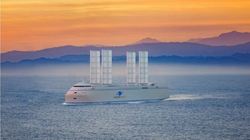Industry proposes mandatory $5bn decarbonisation research and development fund

ICS, BIMCO, WSC, Intertanko, Intercargo, CLIA, Interferry and IPTA have come together to ask governments to set up a new independent fund that can contribute to shipping’s effort to decarbonise. The bodies hope it can be up and running by 2023 and are adamant it should be devoid of political considerations.
Shipping companies would have to pay $2 per tonne of fuel oil each of their ships consumes, probably for about 10 to 15 years.
SHIPPING is calling for the creation of mandatory payments from companies to fund an independent research and development body that will help accelerate maritime decarbonisation.
Under the proposal being made to the International Maritime Organization by eight leading shipping associations, shipowners would pay $2 per tonne of fuel oil each of their ships consumes into a newly formed international maritime research fund to help finance decarbonisation research and development projects.
They said the fund, which would be set up by the IMO, would raise about $5bn over a decade, based on the estimate that the global fleet will consume an average 250m tonnes of fuel oil annually.
“An effort of this scale is expected to be successful in identifying one or more technical pathways that can lead to the introduction of zero-emission vessels across the maritime sector by 2030 and beyond,” the associations said in the proposal, which has been seen by Lloyd’s List.
Lloyd’s List had reported last month that five major shipping associations were plotting to launch this mandatory R&D fund proposal.
That number has since grown to eight, meaning the proposal enjoys overwhelming industry support; the associations claim they collectively account for more than 90% of the global merchant fleet.
They hope the fund can be up and running by 2023.
“Frankly, we need to do that, because the pressure created by the IMO 2050 target is so great. We really do have to start seeing the appearance of zero-carbon ships in the 2030s,” International Chamber of Shipping deputy secretary-general Simon Bennett said during a conference call on Tuesday.
Although the proposal is pencilled in for the next IMO Marine Environment Protection Committee, meeting in April 2020, Mr Bennett acknowledged the focus of regulators on the short-term emissions-reducing measures means the more detailed discussion about the fund may happen at the next MEPC in the autumn of 2020.
The fund would support a proposed International Maritime Research and Development Board, known as IMRB, which would be responsible for approving funding and managing the R&D projects on maritime decarbonisation undertaken by qualified third parties.
“The IMRB and its co-ordinated R&D programmes would help accelerate the development of low-carbon and zero-carbon emission technologies and fuel systems that are specifically tailored for maritime application, especially larger transoceanic ships,” the proposal said.
The associations suggest the IMRB and the international maritime research fund could function for a period ranging between 10 and 15 years, after which they would be dissolved. The specific dissolution date would be up to the MEPC to decide in the future.
The activity of the funded research would also focus on the potential development of prototypes and other aspects such as technical and safety issues associated with the bunkering, use and storage of new fuels.
“Commercial development of relevant technologies, fuels and related infrastructure would be the responsibility of other stakeholders such as energy producers, ports, engine manufacturers, and shipbuilders,” the proposal read.
When it comes to ships consuming low-carbon fuels or fuels with lower greenhouse gas emissions, such as liquefied natural gas, the proposal suggests that the contribution should be smaller than the $2 per tonne.
The industry bodies want to make this payment a legal requirement by amending existing conventions, or through other legal means.
They believe companies should be obliged to pay, but they added that IMO member states could encourage or require other stakeholders to also pay into the international maritime research fund.
The associations stressed that this mandatory payment is not meant to be a market-based measure on the shipping industry nor is it meant to delay the development of a market-based measure, if IMO member states eventually agree to that at some point.
“However, if this IMRB concept is taken forward by the IMO, it could potentially provide some of the architecture for the possible future development of a levy-based market-based measure for shipping, in a manner that would reduce the possibility of market distortion,” the proposal read.